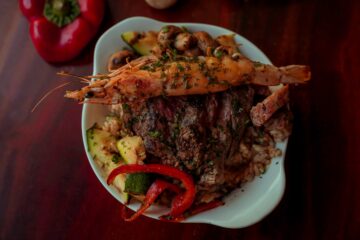The Mediterranean diet is a general term that is based on the traditional healthy eating habits in the countries bordering the Mediterranean Sea including France, Italy, Greece, and Spain. It is more than eating fresh and wholesome food, where there are other vital elements of this diet such as daily physical activity and sharing meals with others.
This diet varies by country and region, but in general, it is based on eating vegetables, fruits, nuts, beans, legumes, cereals, fish, and unsaturated fat like avocado and grains. Also, it is low in meat and dairy food.
Despite what people think, the Mediterranean diet is an inexpensive, satisfying, and very healthy way to eat. switching to a new kind of food takes effort, but trust me it is worth it because you will be on the path to a healthier, happier, and longer life.
In this Complete Mediterranean Diet Guide, we will be discussing how to switch to this diet, list of food that you need to eat and avoid, the health benefits of the diet, and how to build a meal plan
How to Switch to Mediterranean Diet?
Always remember that change starts with small and steady steps, so if you want to adopt the Mediterranean eating style you can start by:
1- having more fruits and vegetables, you can start by having salad as a side dish and snacking on fruits
2- Eating fish instead of red meat
3- including grains in your diet instead of refined rice, bread, and pasta
4- Switching to skimmed dairy instead of whole milk
5- Do not forget breakfast every day, where you can have fruits, grains, or fiber-rich food
6- Use good fat such as sunflower seed, avocado, and extra-virgin olive oil for your daily meals
7- Staying away from food with added sugars like soda and pastries
8- you need to avoid deli meats and other processed meats
9- Avoiding packaged or processed food
10- Make sure you are hydrated which means you need to drink at least 2 liters of water every day
What to Eat:
Your diet should be based on these Mediterranean foods:
• Vegetables: Tomatoes, onions, broccoli carrots, cucumber, etc.
• Fruits: melons, strawberries, oranges, apples, bananas, dates, etc.
• Eggs: Chicken, duck, and quail eggs
• Poultry: Chicken, Turkey, Duck, etc.
• Seafood: Salmon, shrimp, oysters, crab, sardines, etc.
• Healthy fat: Extra virgin oil, avocado oil, olives, and avocado.
• Spices: Pepper, garlic, basil, cinnamon, etc.
• Tubers: Potatoes, sweet potatoes, etc.
• Seed and Nuts: Almond, sunflower seeds, hazelnuts, walnut, etc.
• Legumes: Beans, peanuts, chickpeas, etc.
• Dairy: Cheese, Greek yogurt, Yogurt, etc.
• Grains: whole oats, corn, brown rice, whole wheat, whole grain bread, and pasta.
What to Avoid:
As we mentioned earlier the Mediterranean diet is based on fresh and whole food, so If you want to adopt this style of eating you need to avoid the following foods:
• Refined grains: white bread, pasta, etc.
• Processed meat: deli meat, hot dog, etc.
• Trans fats: margarine, and fat found in processed food
• Added Sugar: found in candies, ice cream, soda, etc.
• Refined oil: Cottonseed oil, Soybean oil, and others.
• All highly processed foods that mean everything which labeled (low fat or diet)
Health Benefits of The Mediterranean Diet:
1- It reduces the risk of diseases:
There are a number of studies that suggest that people who go on a Mediterranean dietary plan are less likely to die of heart disease than people who follow the typical diet. As well as, a study published by the British Journal of Cancer in 2018 showed that people who adopt this type of eating style have a lower risk of prostate cancer, colon cancer, and some head and neck-related cancers.
2- Weight loss:
it can be helpful for those who are trying to lose weight. there are some studies and reviews that show people on the Mediterranean diet lose more weight than those who are on other low-fat diets.
3- Improving sleep quality:
A study that’s been conducted in 2018 showed that the Mediterranean diet improves sleep quality in older adults and it does not affect sleep quality in younger people.
4- It is Low in Saturated Fat:
The Mediterranean Diet Guide limits large amounts of red or processed meats and other sources of saturated fat. It relies on monosaturated fatty acids such as nuts, olive oil, and avocado which will keep the saturated fat levels low. As result, it reduces the risk of having a high level of cholesterol.
Building a Meal Plan:
There is no other diet that focuses on plant foods more than the Mediterranean plan, where it is not uncommon for vegetables, legumes, and whole grains to make up most of the meals. Also, the diet is based on consuming healthy fat which means you will be using it for cooking as well, such as olive oil.
So, when you are planning your meals, they should be all made of the food that we mentioned above; here is an example of two days meal plan:
Day 1:
Breakfast: Oats with Greek yogurt and strawberries
Lunch: Whole-grain sandwich, with cheese and fresh vegetables.
Dinner: A tuna salad dressed in olive oil
Dessert: an apple
Day 2:
Breakfast: Oats with cinnamon, dates, and honey
Lunch: Tuna on a bed of vegetables with a vinaigrette
Dinner: One and a half cups of whole grain pasta with tomato sauce, grilled vegetables, and olive oil
Dessert: Greek yogurt
Conclusion:
Following the Mediterranean Diet Guide is not a temporary thing, it is a long-term, sustainable way of eating. Anyone who wants to live a healthy life should always adopt a diet that is rich in fresh food such as fruits, vegetables, whole grains, and healthy fats. You can achieve that by following the Complete Mediterranean Diet Guide.
As always say do not go on any diet until you talk to your physician or dietitian especially if you have a health condition. They can help you by recommending additional or alternative food.
Other Options To Lose Weight:
This is not the only way to change your diet and alter your lifestyle to help you lose weight and live a healthy life, there are many alternatives that can help lose weight and have the body of your dream. You may find other leaflets in this series helpful, including:
- Simple Guidance For You In The Different Types Of Diets
- Here’s What you need to know About Dukan Diet Phases






0 Comments